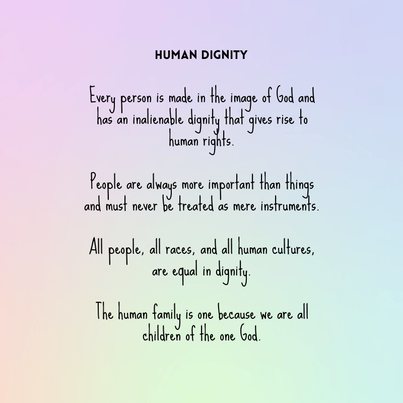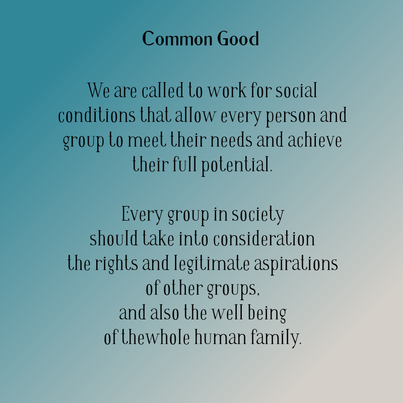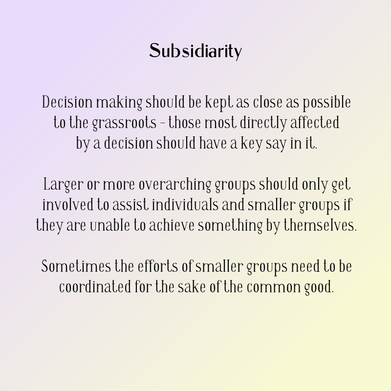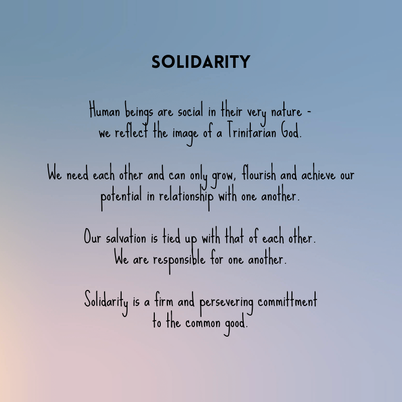Catholic Social Teaching
Four Principles of Catholic Social Teaching
adapted from: WWW.SOCIAL-SPIRITULITY.NET Contemplation & Action for a Faith that Does Justice
Seven Themes of Catholic Social Teaching
Respect for the Dignity and Life of the Human Person, from Conception to Natural Death The foundation of all Catholic Social Teaching is an unwavering commitment to the dignity and worth of every human being, without exception. The Book of Genesis teaches that every human person is created in the image and likeness of God. Thus all human life, at every stage from conception through natural death, is sacred. The human person is the clearest reflection of God among us. We are therefore called to revere and cherish the life of every person.
Call to Family and Community Life Each person is not only sacred but social. The family is the central social institution that must be supported and strengthened, not undermined. How we organize our society - in economics and politics, in law and policy - directly affects human dignity, the family, and the capacity of individuals to grow and support one another in community. We realize our dignity and rights in relationship with each other, in community. Human beings grow and achieve fulfillment in community.
The Right and Duty to Participate in Social, Economic and Political Life It is a fundamental demand of justice and a requirement for human dignity that all people have the opportunity to participate in the social, economic and political decisions that affect their lives. It is wrong for a person or group to be excluded unfairly or to be unable to participate in society.
Advancing the Common Good The obligation to "love our neighbor" has an individual dimension, but it also requires a broader social commitment. Everyone has the responsibility to contribute to the good of the whole society, to the common good. It is contrary to the spirit of the Gospel to look after "me first" at the expense of others, especially the most needy in society at home and abroad.
Promoting Peace and Social Justice Working for peace and social justice is not an optional commitment; it is a requirement of our Catholic faith. As Pope Paul VI taught, "If you want peace, work for justice." We are called to promote nonviolent approaches to resolving our conflicts whenever possible, and to contribute to the creation of a more just society and world.
Promoting Human Rights and Responsibilities The Catholic tradition teaches that human dignity can be protected and a healthy community can be achieved only if human rights are protected and responsibilities are met. Every person has a fundamental right to life and a right to those things required for human decency. Corresponding to these rights are duties and responsibilities - to one another, to our families, to the larger society, and to the global community.
Special Care and Concern for the Poor and Vulnerable A basic moral test of society is how it treats its most vulnerable members. The poor have the most urgent moral claim on the conscience of the nation. We must join our works of charity with works of justice, meeting the immediate needs of the poor and vulnerable while we evaluate public policies in terms of how they affect the poor and the vulnerable - and advocate for policies that are just and promote human dignity. The Dignity of Work and the Rights of Workers Work is more than a way to make a living; it it a form of continuing participation in God's creation. If the dignity of work is to be protected, then the basic rights of workers must be respected - the right to productive work, to decent and fair wages, to organize and join unions, to private property, and to economic initiative. The economy exists to serve people, not vice versa.
Solidarity - Loving Our Neighbor Locally and Globally We are all brothers and sisters of one God, one human family. We are our brothers' and sisters' keepers, wherever they live. We are one human family, whatever our national, ethnic, racial, economic or ideological differences. Learning to practice the virtue of solidarity means learning that "loving our neighbor" has global dimensions in an interdependent world. In recognizing our solidarity, we recognize the truth that we are indeed the body of Christ.
Caring for God's Creation: Stewardship of the Earth We show our respect for our Creator by our care and stewardship of all creation. The goods of the earth are gifts from God and are intended by God for the benefit of everyone, in every generation. We have a responsibility to care for these goods as stewards and trustees, not as mere consumers and users. The whole earth proclaims the glory of God!
Call to Family and Community Life Each person is not only sacred but social. The family is the central social institution that must be supported and strengthened, not undermined. How we organize our society - in economics and politics, in law and policy - directly affects human dignity, the family, and the capacity of individuals to grow and support one another in community. We realize our dignity and rights in relationship with each other, in community. Human beings grow and achieve fulfillment in community.
The Right and Duty to Participate in Social, Economic and Political Life It is a fundamental demand of justice and a requirement for human dignity that all people have the opportunity to participate in the social, economic and political decisions that affect their lives. It is wrong for a person or group to be excluded unfairly or to be unable to participate in society.
Advancing the Common Good The obligation to "love our neighbor" has an individual dimension, but it also requires a broader social commitment. Everyone has the responsibility to contribute to the good of the whole society, to the common good. It is contrary to the spirit of the Gospel to look after "me first" at the expense of others, especially the most needy in society at home and abroad.
Promoting Peace and Social Justice Working for peace and social justice is not an optional commitment; it is a requirement of our Catholic faith. As Pope Paul VI taught, "If you want peace, work for justice." We are called to promote nonviolent approaches to resolving our conflicts whenever possible, and to contribute to the creation of a more just society and world.
Promoting Human Rights and Responsibilities The Catholic tradition teaches that human dignity can be protected and a healthy community can be achieved only if human rights are protected and responsibilities are met. Every person has a fundamental right to life and a right to those things required for human decency. Corresponding to these rights are duties and responsibilities - to one another, to our families, to the larger society, and to the global community.
Special Care and Concern for the Poor and Vulnerable A basic moral test of society is how it treats its most vulnerable members. The poor have the most urgent moral claim on the conscience of the nation. We must join our works of charity with works of justice, meeting the immediate needs of the poor and vulnerable while we evaluate public policies in terms of how they affect the poor and the vulnerable - and advocate for policies that are just and promote human dignity. The Dignity of Work and the Rights of Workers Work is more than a way to make a living; it it a form of continuing participation in God's creation. If the dignity of work is to be protected, then the basic rights of workers must be respected - the right to productive work, to decent and fair wages, to organize and join unions, to private property, and to economic initiative. The economy exists to serve people, not vice versa.
Solidarity - Loving Our Neighbor Locally and Globally We are all brothers and sisters of one God, one human family. We are our brothers' and sisters' keepers, wherever they live. We are one human family, whatever our national, ethnic, racial, economic or ideological differences. Learning to practice the virtue of solidarity means learning that "loving our neighbor" has global dimensions in an interdependent world. In recognizing our solidarity, we recognize the truth that we are indeed the body of Christ.
Caring for God's Creation: Stewardship of the Earth We show our respect for our Creator by our care and stewardship of all creation. The goods of the earth are gifts from God and are intended by God for the benefit of everyone, in every generation. We have a responsibility to care for these goods as stewards and trustees, not as mere consumers and users. The whole earth proclaims the glory of God!




